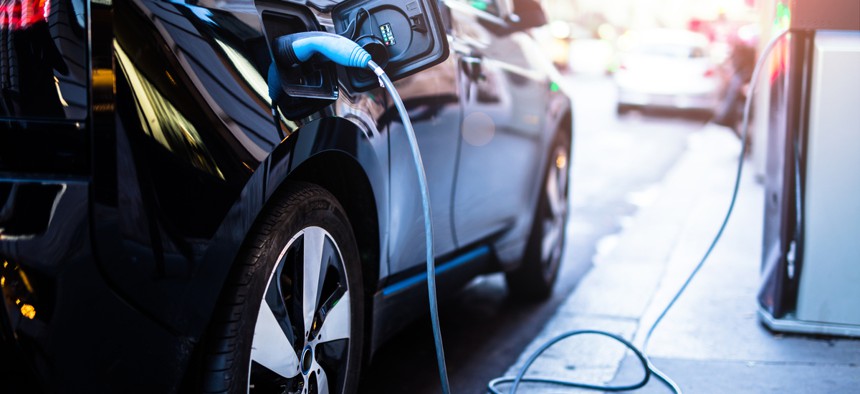House Lawmakers to Introduce Bipartisan Bill to Advance Agencies’ Use of Electric Vehicles

Shutterstock/guteksk7
Agency charge cards could soon be used for more than refueling gas-powered automobiles.
Bipartisan legislation set to be introduced in the House Tuesday would make it easier for federal agencies to charge their government-provided electric vehicles, Rep. Ro Khanna, D-Calif., confirmed to Nextgov.
A companion measure to a bill previously passed in the Senate, the Charging Helps Agencies Realize General Efficiencies or CHARGE Act to be put forth by Khanna and Rep. Anthony Gonzalez, R-Ohio, marks a deliberate move to further the government’s use and purchase of the eco-friendly automobiles.
Specifically, the proposed legislation would direct the General Services Administration to release guidance enabling Fleet Services Cards—agencies’ main means to refuel gas-powered government vehicles—to cover EV charging. GSA would also have to distribute charge cards for each EV at all federal agencies within 180 days of the bill’s passage.
“Fleet Service Cards act just like credit cards at a gas station,” Khanna said. “We should let them be used for EV charging too.”
Because the present payment cards don’t cover electric automobiles, right now, agencies’ only option to power government-issued EVs is by charging them inside their federal facilities’ garages. A member of the House Oversight and Reform Committee who has sponsored and helped craft other EV-focused bills in the past, Khanna pinpointed a report published by the Government Accountability Office last year demonstrating a range of challenges hindering the integration of alternative fuel vehicles into the federal fleet.
“We need to make EVs as convenient as combustion vehicles,” Khanna said.
The CHARGE Act was originally introduced in the Senate by Sens. Gary Peters, D-Mich, and Rob Portman, R-Ohio, in July 2019 and, there, passed by unanimous consent in November of that year. Khanna said he’d spent some time working to find a Republican House co-lead on the measure because he “thought it was important to keep this bill bipartisan in both chambers.”
“Innovation in government processes is key to advancing policies that propel our nation forward,” Gonzalez, the House bill’s co-sponsor said in a statement shared with Nextgov. “The CHARGE Act will update federal government policy by making common sense changes that encourage government innovation and bring our operations further into the 21st century.”
Bicameral, bipartisan interest could improve the legislation’s chances to pass in the House, which Khanna wants to see happen before the end of the year.
“There’s a growing appetite across the aisle to take action on green energy. We can agree that we don’t want China to win the green energy race,” Khanna said. “We want the jobs created by EVs and renewables to be here in the U.S.”
Beyond the new policies, Khanna would like to see an expansion of EV use across the government over the next half-decade. He noted that lawmakers deliberately included money in the House infrastructure package for updating the postal fleet with EVs.
“There’s no reason that the postal fleet can’t be electrified, especially for shorter distance trips,” he said.
Further, the Silicon Valley-representing congressman said he’d also like for Congress to make more progress on electrifying the transportation grid. The Environmental Protection Agency revealed in 2018 transportation makes up the largest portion—28%—of total U.S. greenhouse gas emissions.
“Bringing that down will save lives,” Khanna said. He added that, generally, the private sector and automakers are moving toward electric or other zero-emission vehicles, reiterating “we can create thousands of jobs by ensuring those vehicles are made in the U.S.”
Looking ahead to the rest of the legislative session, Khanna is still rooting for his previously introduced bills on the Centers of Excellence and IoT cybersecurity to move forward before the end of the year. He also articulated aims to continue his push advocating for funding for the Technology Modernization Fund in the next pandemic package.
“We must keep working to bring federal government technology into the 21st Century,” Khanna said. “Our outdated tech has slowed down our response to the pandemic. It hurts our ability to do policies like the stimulus checks and [Paycheck Protection Program] loans.”
Brandi Vincent is a staff correspondent for Nextgov.
NEXT STORY: Automated analytics for the tactical edge






